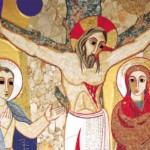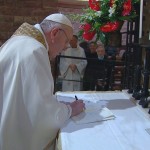Disciples and servants of fraternityTheological Seminar SCJ, Final message
Final message at the end of the SCJ Seminar on "Sint Unum: Challenges and prospects today" (11-18 July 2020)
1. Between July 11-18, 2020, with fraternal joy, we Dehonian Theologians met for a Theological Seminar of the Congregation entitled “Sint Unum: Challenges and Perspectives Today.” Originally planned to be held in Yaoundé (Cameroon), the seminar was held online because of the pandemic crisis. This situation brought limitations with regard to personal encounters among us; yet, given the reality of our times, this mode of gathering still provided us with the opportunity to live out Sint Unum and to exercise it in a concrete and constructive way.
2. As we read in the letter of the preparatory committee, the seminar “intends to explore the actuality, challenges and implications of Sint Unum, not only for the Congregation, but also for our world—today’s world damaged by growing particularisms and polarization. Sint Unum, central to the Dehonian tradition, makes it possible for us to reflect upon the links that tie the spiritual, communal, and social dimensions of our life. In this way we will strive to discover how the theme still has much to say for today’s societies.” The introductory words of Father General encouraged us to proceed with the seminar in this way.
The reality of sin
3. As our Rule of Life states (Cst. 4), Fr. Dehon was “very sensitive to sin”; he thus analysed sin in its causes and its consequences. He saw the roots of sin “in the refusal of the love of Christ”: not only in human refusal to love Christ, but also—and above all—in human obstacles that close off the love that comes from Christ.
4. It is from this theological (indeed, Christological) view of sin that we are able to discern its results and, at the same time, understand how sin may permeate reality on anthropological, communal, social, and cosmic levels. Sin, thus, threatens the integrity of the human person, our links with one another, and our relationship with the entirety of creation.
5. The manifestations of sin are pervasive; its forms often take on various disguises. Already, the preparatory letter for the seminar mentioned “worrying nationalism, racial and religious issues, tribalism, ethnicism, racism, caste system, . . . which damage our communities and future generations.” To this can be added other manifestations:
- the disregard for God,
- the absolutization of freedom without proper limits and responsibility,
- the denial of the dignity of the other through an irresponsible exercise of power and authority,
- the objectification of the other,
- economic poverty arising from oppressive and unfair economic systems,
- the indiscriminate exploitation of creation (“ecological sin”).
6. It seems to us particularly necessary to re-emphasize how these different forms of sin constitute a “pseudo-culture,” definable as a “culture of death” (John Paul II), or a “culture of waste” (Francis) which crystallize into “structures of sin.” For us, any conversation on Sint Unum which disregards the complexity and pervasiveness of these dimensions of sin risks being purely ungrounded spiritualism.
The dimensions of Sint Unum
7. In the face of this reality, Jesus’ invitation resounds with his imperative that all be one (Jn 17:11, 21, 22). If sin is ultimately the breaking of the bonds which honour the dignity of humans and the world, Sint Unum presents itself as the response which God expects from his disciples . . . and from all humanity. In the following paragraphs, we wish to highlight three aspects of our life of Sint Unum, along with accompanying challenges and perspectives which confront our Congregation.
a) Priority of God’s Agape in Christ
8. Father Dehon’s hermeneutical approach emphasized the idea that the root of sin lies in the refusal of, and the indifference toward, Christ’s love for us; so, instead of understanding Christ’s love in the light of sin, Fr. Dehon understood sin in the light of God’s love. Because of this, Sint Unum and sin are not on the same level: there is a priority of God’s love (agape) in Christ. This priority reveals the possibility of living Sint Unum. We grasp this priority in the fact that Christ humbled himself (kenosis) to the point of dying for us in order to bring together all the children of God (Phil 2:6-11, Jn 11:52). Risen, with the Father he lives in us (Jn 14:23) and draws us to himself, so that we may share in his full communion of love with the Father and the Spirit.
9. The priority of God’s agape in Christ presents us with challenges:
- -to live fully in union with the heart of Christ, especially through the Eucharist in which he makes us “one body and one spirit”;
- to live a fully integrated life;
- to witness that Sint Unum, before being a human effort, is a gift from the Trinity;
- to live reparation as an urgent response to the priority of God’s oblative love for us; that is, as a “welcome to the Spirit” (Cst. 23).
b) The “sacrament” of fraternal life
10. Sint Unum places us within the life of the Trinity. This Trinitarian life is the locus in which we recognize the perfection of love which gives itself to others, which defines the uniqueness of each person, and creates unity among them. The “conversation” of love in the Trinity (pericoresi) becomes for us an inspiration and reference point for our fraternal life. Sint Unum, however, is not a simple premise; it is a gift, a process, a task always to be completed. It is, in the words of Pope Francis, the “mystique of living together” (EG 87). We exercise Sint Unum above all in our fraternal life—which is, indeed, our primary apostolate (Cst. 60). Since our community life is the place where the invitation to live mutual charity resounds, our witness on behalf of the life of the world emerges more clearly: “Through fellowship even above and beyond conflicts, and through mutual forgiveness, we would like to be a sign that the fraternity for which people thirst is possible in Jesus Christ and we would like to be its servants” (Cst. 65).
This “sacrament” of fraternal life presents us with some challenges. Because of the power of the mercy given to us in the heart of Christ, we are called to welcome one another in our diversity (i.e, our cultural, ethnic, generational diversity); and, even more, to consider one another—and fraternal life with one another—as “sacrament.” In order to make this possible in concrete terms, we have identified three areas in which we may easily forget this sacramental aspect of our life.
- The first area concerns psychological dynamics which often unconsciously prevent us from welcoming and valuing each other. Our relationships are marked by a “power” which, if it is not converted into “service,” denies the uniqueness of the brother and, in the most serious cases, leads him to self-destructive behaviour.
- The second area concerns the administration of goods. Fraternity is also built up by means of the proper relationship with what we possess: we, therefore, believe it necessary to grow in the transparency and co-responsibility with respect to our financial administration; this, not only within the commonwealth of society’s goods, but also in solidarity among ourselves. Our efforts must be aimed at restoring a human face to the economy, especially in this time when, as Pope Francis says, it often “kills” (EG 53).
- The third area touches on the aspect of synodality, our walking together. As we adopt synodality from a theological point of view, we must also incarnate synodality in concrete, practical, and verifiable ways. This is true concerning the exercise of authority, as well as the need to live a life more fully grounded in reconciliation.
c) “That the world may believe…”.
11. Sint Unum is also prophetic: Jesus desires that his disciples be “one . . . so that the world may believe . . .” (Jn 17:21). In this sense, Fr. Dehon asked that his religious be “prophets of love and servants of reconciliation of people and the world in Christ” (Cst. 7). Sint Unum, in other words, does not close us in on ourselves, but urges us to be on the road, to go always further: Sint Unum sends us on mission (Adveniat Regnum Tuum) as a constitutive dimension of our discipleship. By walking with the Lord and striving together with our brothers and sisters, we come to know how to approach each person, especially the poorest and those most in need.
12. Jesus’ words “that the world may believe” challenge for us.
- The quality of our union with Christ is not only manifested in our community life, but it is also revealed in our commitment to, and dialogue with, those who are oppressed and needy. Living our fraternal life and our missionary life go hand in hand.
- In the present situation of our Mother Earth we recognize the challenge of a particular form of poverty. Promoting an ecological spirituality and commitment seems to us to be particularly necessary in today’s context. This, indeed, is a form of communion with creation, and with future generations.
- Finally, Sint Unum calls us to witness and commit ourselves to the unity of the Church of Christ (ecumenical commitment), as well as to engage in constructive dialogue with other religious and cultural expressions (inter-religious and transcultural dialogue).
Disciples and servants of fraternity
13. In light of this Seminar, we would like to encourage all our confreres to explore, experience, and promote a spirit of Sint Unum in their communities and apostolates. Sint Unum opens to us various and captivating avenues for reflection; in its richness we will be able to analyse and appreciate it only gradually. Sint Unum—invoked, practiced, and witnessed, above all, in fraternal life—presents itself as a remedy for our selfishness, a check on our desire to dominate others out of economic and power interests, and a balm for the traumas that mark our lives. Sint Unum, in short, loosens the chains of sin, gives us the freedom of the children of God, and opens for us our mission for the life of the world. May Mary, first disciple of the Lord and promoter of unity, and always attentive to doing the Father’s will, help us in this fascinating task.




